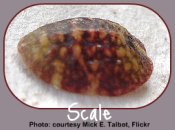- Home
CARE for your HOUSE PLANTSGROWING HOUSE PLANTSCHILDREN & PETS & PLANTSGIFTS for the INDOOR GARDENERSCIENCE of HOUSE PLANTSSITE LOGISTICS- Tell your story
|
Scale Insects
Info for the Indoor Gardener
Among the hard-to-find garden pests are the scale insects, both soft and armored. The information below the Google ads helps the Indoor Gardener emerge triumphant in this battle.
DESCRIPTION
- soft scale insects are most common on houseplants
- adults motionless
- flat, oval to spherical shapes
- 1/8 - 1/2 inch
- tan, black, brown in most species
- excretions form hard shells
- secrete honeydew similar to mealy bugs
- armored scales
- 1/16 - 1/8 inch
- round
- central spot on bodies
- no honeydew
- piercing mouth parts

LOCATION
- plant stems
- underside of leaf
- sometimes on top of leaves
- some species prefer leaf veins
- soft scale: twigs and leaves
MULTIPLICATION
- prefer warm, dry environments
- also prefer over-fertilized houseplants
- slower life cycle (see below) than many other garden pests that infest houseplants
DESTRUCTION
- suck juices from the plant
- weaken plants
- honeydew and mold interfere with photosynthesis
- leaves yellow or spot, wither, drop off
- branches die
DETECTION
- hard to notice
- ants often give them away when attracted to honeydew secretions
- hard scales: produce spotting around location
- these garden pests look like small lumps on leaves or stems
- search for leaf problems or branch die-back
- check for honeydew and sooty mold that grows from it
- search in crevices of bark on stems, leaf joints, under leaves
- use 10x magnifying lens
SOLUTION
- easy if found early
- isolate the plant immediately
- cut off affected branches
- can wipe, rub, or pick off the scale insects if not too profuse
- use soapy water (warm) to wash plant, rub off each leaf, rinse
- insecticidal soap doesn't work well on adults; minimally on young, as it's repelled by waxy coating of scale insects
- suffocate them with insecticidal oil, such as Neem oil
- use cotton swabs with rubbing alcohol (apply weekly, at least 2-3 times)
- Malathion as spray or dip (follow directions)
- Soft Scales:
- spray oils
- rubbing alcohol or soap sprays (especially in crawler stage)
- if using insecticides for crawler stages, continue usage up to 4 months
- if using pyrethrin or resmethrin (follow directions), apply weekly
- systemic insecticide, such as imidacloprid, usually works for soft scale insects
- increase light
- avoid over-fertilization
- increase root strength and health
- natural predators for greenhouses, conservatories, and large indoor spaces:
- ladybugs
- green lacewings
- parasitoids (predatory wasp)
- Armored Scales: horticultural oils are most often recommended
- Chemicals: follow directions carefully; time for crawler stage when most effective
- use sticky yellow cards to detect crawler stage
For Botanists, Scientists, Outdoor Gardeners, and School Reports
- Soft Scales: Coccidae
- Coccus herperidum = most common brown scale
- Saissetia coffeae = hemispherical scale
- Armored Scales: Diaspididae
- Florida alone has 13 Families of scale insects (including mealy bugs)
- Florida also has over 175 species of armored scales
- Florida has more than 60 species of soft scale insects
- Life Cycle:
- female produces eggs continuously for several weeks
- eggs hatch under the mother
- eggs hatch in 1-3 weeks
- nymphs or crawlers - move short distances to establish their own feeding area
- produce shell and emit honeydew in new location
- 2 - 4 months until adult; rarely move
- some species grow wings and move to other plants
DISCLAIMER: The Indoor-Gardener.com provides information through data research and personal experience and does not mean to recommend or refute any product used for insect control inside or outside the house. Read and follow instructions carefully as listed on all products. Indoor-Gardener.com is not responsible for use of any product or method described on these pages, nor for any possible adverse affects of such use. The legal use of chemicals for plant health can change, and it is solely the responsibility of the user of such chemicals to remain in compliance with such laws. Indoor-Gardener.com and Batya D. Wininger assume no liability resulting from the use of any information on these pages. While this website does its best to provide only the best, up-to-date information to its visitors, there can be changes and mistakes. Read labels carefully and follow instructions for use.
Back to Top of Page
Return to Garden Pests
Return to Home Page
|
|
|
